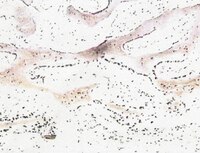MAB19310 Sigma-AldrichAnti-Aggrecan Antibody, MMP Cleaved, NT FFGVG neoepitopes, clone AF-28
Detect Aggrecan using this Anti-Aggrecan Antibody, MMP Cleaved, N-terminus FFGVG neoepitopes, clone AF-28 validated for use in ELISA & WB.
More>> Detect Aggrecan using this Anti-Aggrecan Antibody, MMP Cleaved, N-terminus FFGVG neoepitopes, clone AF-28 validated for use in ELISA & WB. Less<<Recommended Products
Overview
| Replacement Information |
|---|
Key Specifications Table
| Species Reactivity | Key Applications | Host | Format | Antibody Type |
|---|---|---|---|---|
| B, H, M, Po, R | ELISA, WB | M | Purified | Monoclonal Antibody |
| References |
|---|
| Product Information | |
|---|---|
| Format | Purified |
| Control |
|
| Presentation | Liquid in PBS pH 7.4 containing 0.09% sodium azide as a preservative. |
| Quality Level | MQ100 |
| Physicochemical Information |
|---|
| Dimensions |
|---|
| Materials Information |
|---|
| Toxicological Information |
|---|
| Safety Information according to GHS |
|---|
| Safety Information |
|---|
| Packaging Information | |
|---|---|
| Material Size | 100 µg |
| Transport Information |
|---|
| Supplemental Information |
|---|
| Specifications |
|---|
| Global Trade Item Number | |
|---|---|
| Catalog Number | GTIN |
| MAB19310 | 04053252467509 |
Documentation
Anti-Aggrecan Antibody, MMP Cleaved, NT FFGVG neoepitopes, clone AF-28 SDS
| Title |
|---|
Anti-Aggrecan Antibody, MMP Cleaved, NT FFGVG neoepitopes, clone AF-28 Certificates of Analysis
References
| Reference overview | Pub Med ID |
|---|---|
| The composition of the mesenchymal stromal cell compartment in human bone marrow changes during development and aging. Maijenburg, MW; Kleijer, M; Vermeul, K; Mul, EP; van Alphen, FP; van der Schoot, CE; Voermans, C Haematologica 97 179-83 2012 Show Abstract | 21993672
 |
| MMP proteolysis of the human extracellular matrix protein aggrecan is mainly a process of normal turnover. Struglics, A; Hansson, M The Biochemical journal 446 213-23 2012 Show Abstract | 22670872
 |
| Multiple functions of Osterix are required for bone growth and homeostasis in postnatal mice. Zhou X, Zhang Z, Feng JQ, Dusevich VM, Sinha K, Zhang H, Darnay BG, de Crombrugghe B Proc Natl Acad Sci U S A 2010 Show Abstract | 20615976
 |
| Analysis of aggrecan in human knee cartilage and synovial fluid indicates that aggrecanase (ADAMTS) activity is responsible for the catabolic turnover and loss of whole aggrecan whereas other protease activity is required for C-terminal processing in vivo Sandy, J. and Verscharen, C. Biochemical Journal, 358:615-626 (2001) 2001 | 11535123
 |
| Soluble recombinant neprilysin induces aggrecanase-mediated cleavage of aggrecan in cartilage explant cultures Chevrier, A, et al Arch Biochem Biophys, 396:178-86 (2001) 2001 | 11747295
 |
| Recombinant human aggrecan G1-G2 exhibits native binding properties and substrate specificity for matrix metalloproteinases and aggrecans Mercuri, A. et al. Journal of Biological Chemistry, 274:32387-32395 (1999) 1999 | 10542281
 |
| Aggrecan degradation in human intervertebral disc and articular cartilage Sztrolovics, R, et al Biochem J, 326 ( Pt 1):235-41 (1997) 1997 | 9337874
 |
| Degradation of cartilage aggrecan by collagenase-3 (MMP-13) Fosang, A. et al FEBS Letters, 380:17-20 (1996) 1996 | 8603731
 |
| Development of a cleavage-site-specific monoclonal antibody for detecting metalloproteinase-derived aggrecan fragments: detection of fragments in human synovial fluids Fosang, A J, et al Biochem J, 310 ( Pt 1):337-43 (1995) 1995 | 7544117
 |








